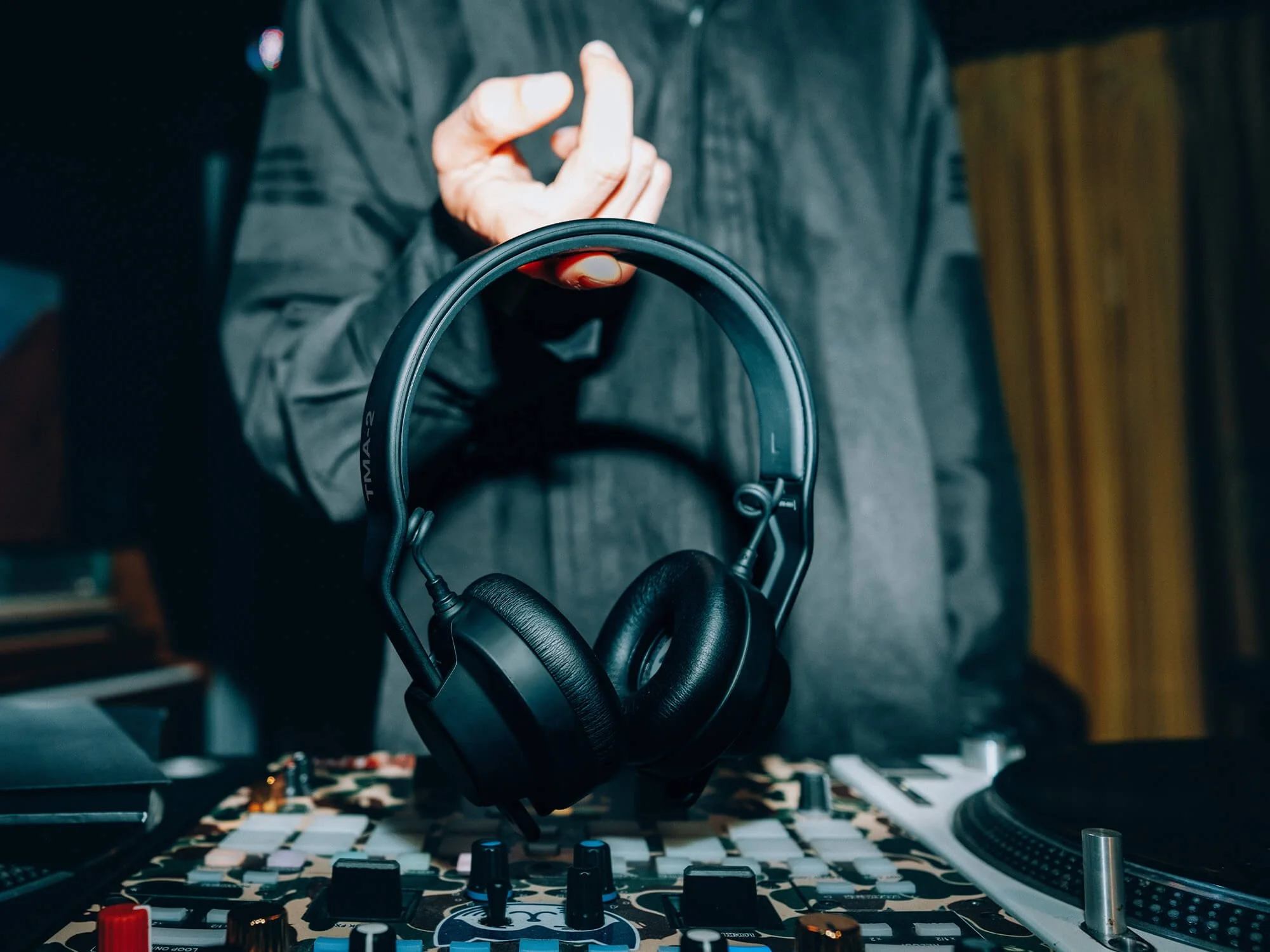What Are the Best Wireless DJ Headphones? AIAIAI and AlphaTheta Compared

For years, going wireless as a DJ meant choosing between convenience and control — and usually, sacrificing the latter. Bluetooth headphones just couldn’t deliver the low latency required for tight cueing and beatmatching, which meant serious DJs stuck with cables, no matter how tangled or annoying they got. But in 2025, that story has changed. Two standout headphones have finally made wireless DJing feel real: the AIAIAI TMA-2 DJ Wireless and the AlphaTheta HDJ-F10 TX. These aren't just Bluetooth headphones with a DJ sticker slapped on — they're built with custom low-latency tech that lets you mix, cue, and perform live without the lag. Whether you're prepping a set at home or playing to a crowd, these headphones promise to cut the cord without cutting corners. In this post, we’re diving deep into what makes these two headphones so special — and how they stack up against each other (and against popular wired classics like the Sennheiser HD 25 and Audio-Technica M50x). If you've been waiting for a reason to ditch the cable, this might just be it.
TL;DR
AIAIAI TMA-2 DJ Wireless+
Ultra-low latency (<10ms)
Modular design, lightweight and customizable
Up to 20 hours battery life
Includes coiled cable for wired backup
AlphaTheta HDJ-F10 TX
Ultra-low latency (<9ms)
Active Noise Cancelling and premium isolation
Sound profile based on HDJ-X10 drivers
Up to 9 hours battery life on wireless
Includes both straight and coiled cables for wired backup
Disclosure: This post contains affiliate links. If you buy something through these links, I may earn a commission at no extra cost to you. As an Amazon Associate, I earn from qualifying purchases.
Why Wireless DJing Was a Problem (Until Now)
If you've ever tried mixing with Bluetooth headphones, you probably learned the hard way that latency kills the vibe. Even with advanced codecs like aptX or AAC, you're still dealing with around 100 milliseconds of delay — enough to throw off your cue points, make beatmatching frustrating, and completely break any kind of live FX or scratching flow. For DJs, where timing is everything, that delay is more than just a technical hiccup — it's a dealbreaker.
This is why wired headphones have remained the go-to for decades. The direct connection ensures zero latency, consistent sound quality, and reliable stereo imaging — all crucial when you’re lining up tracks, isolating elements in the mix, or playing back in noisy environments. Even as wireless tech improved for casual listening, DJing always demanded more precision and immediacy than Bluetooth could handle.
That’s what makes this new wave of low-latency wireless protocols such a big deal. AIAIAI’s W+ Link and AlphaTheta’s SonicLink aren’t just marketing names — they’re specialized wireless systems designed to deliver sub-10ms latency, making real-time cueing and mixing finally possible. It’s not a workaround. It’s a leap forward. And for the first time, it feels like wireless DJ headphones aren’t a compromise — they’re a real option.
AIAIAI TMA-2 DJ Wireless
AIAIAI has been doing things differently since day one, and the TMA-2 DJ Wireless is a perfect example of that philosophy in action. Built on the company’s signature modular design, this headphone system lets you customize everything — from the headband and drivers to the ear pads and cables. But what really sets this version apart is the addition of W+ Link, a proprietary 2.4GHz wireless protocol that delivers ultra-low latency (sub-10ms) and lossless audio transmission. That means you can cue, scratch, and mix in real-time with zero perceptible lag — all without being tethered to your booth.
In terms of build, the TMA-2 DJ Wireless is feather-light yet surprisingly rugged. The matte finish and minimalist design feel premium without being flashy, and the parts are easily swappable if anything wears out or needs an upgrade. Battery life is a major win here — you get up to 20 hours of wireless playtime via W+ Link, and even more when using standard Bluetooth for casual listening. It also includes a coiled cable for backup, so if the battery runs out mid-set, you're covered.
Sound-wise, this headphone leans slightly toward the neutral side with just enough punch in the low end to keep your kick and basslines clear in the mix. It’s detailed and accurate rather than hyped — ideal for long sessions where fatigue is a factor. And because it uses the H10 headband with built-in transmitter and USB-C charging, it integrates seamlessly with both laptops and standalone DJ gear. For digital DJs looking for flexibility without compromise, the TMA-2 DJ Wireless is a genuinely innovative option.
For more info about this model, click here to check out our post on the topic!
Check price here
AlphaTheta HDJ-F10 TX
The AlphaTheta HDJ-F10 TX feels like the natural evolution of Pioneer DJ’s headphone legacy — but with a futuristic twist. Built around the brand-new SonicLink wireless protocol, this model delivers latency under 10ms using a dedicated 2.4GHz transmitter that comes in the box. Unlike Bluetooth, SonicLink is designed from the ground up for DJ performance, offering near-instant audio transmission that holds up even in crowded RF environments like clubs and festival stages. It's the first truly pro-grade wireless release from the Pioneer DJ family since the rebrand to AlphaTheta — and it shows.
The HDJ-F10 TX isn’t just about going wireless — it’s about premium sound and build quality too. The headphone features hybrid active noise cancelling, a rarity in DJ gear, which helps isolate you from booth rumble or ambient noise during travel. The drivers are derived from the flagship HDJ-X10, delivering powerful, full-bodied sound with an extended low-end and sparkling highs — perfect for locking in transitions or monitoring intricate effects. With up to 9 hours of battery life on SonicLink and additional Bluetooth support for casual listening, it's a headphone built for both stage and studio.
Aesthetically, it’s sleek and unmistakably pro — heavy-duty hinges, thick padding, and a streamlined profile that balances comfort and durability. If you’re already in the Pioneer DJ ecosystem, the HDJ-F10 TX will feel like a natural fit, pairing effortlessly with CDJs, DJMs, and Rekordbox-compatible gear. This is the wireless headphone for DJs who want the freedom of movement without sacrificing the feel and sound of a high-end club-ready can.
Check price here
Real-World Performance
Both the TMA-2 DJ Wireless and the HDJ-F10 TX promise ultra-low latency, and in real-world use, they deliver. Whether you’re nudging jog wheels, juggling FX, or timing cue points to the snare, both headphones feel immediate and responsive, with no perceptible delay. If you're used to Bluetooth headphones, the difference is night and day. The TMA-2 might have a slight edge in battery life and stability when moving around large rooms, while the F10 TX feels more optimized for short-range precision and environments with lots of wireless interference.
Comfort is another area where these headphones diverge. The TMA-2 is lightweight and minimal, making it ideal for long production sessions or extended prep work. Its modular build means you can tweak the fit to your liking, even swapping ear cushions or headbands if needed. The HDJ-F10 TX, on the other hand, is built like a tank — heavier, padded, and noticeably more isolating thanks to its active noise cancellation. It’s more of a “put it on, lock in, and block out the world” kind of experience, especially in high-volume settings like clubs or outdoor events.
In terms of sound, both deliver detail and clarity, but with slightly different voicings. The TMA-2 DJ Wireless leans toward neutral and flat, giving you an honest picture of your mix. It’s great for subtle EQ tweaks and general accuracy. The HDJ-F10 TX brings a more colored, club-friendly response — enhanced bass, rich mids, and a bit of sparkle on the top. If you love to feel your drums while cueing or want that big-system vibe in your headphones, the F10 TX has the edge. It really comes down to your personal taste and workflow.
How They Compare to Wired Classics (and Who They're For)
Ask any working DJ what they use, and there’s a good chance you’ll hear the same few names: the Sennheiser HD 25, the Audio-Technica ATH-M50x, or the Pioneer HDJ-CUE1. These are industry staples for a reason — they’re reliable, sound great, and have zero latency thanks to their wired connection. The HD 25 is famously lightweight with tight clamping force and crisp highs, making it a go-to for vinyl heads and techno selectors. The M50x is more of an all-rounder: studio-quality sound with deep bass and a foldable design. And the CUE1 has become a favorite among entry-level DJs for its affordability and surprising durability.
So how do the TMA-2 DJ Wireless and HDJ-F10 TX stack up? Technically, both deliver performance that matches — and in some ways surpasses — their wired counterparts. In terms of latency and frequency response, they’re right there. But what sets them apart is the freedom of movement they offer. You’re not tangled in cables when reaching across the mixer, switching decks, or moving around the booth. For DJs who like to perform dynamically, interact with the crowd, or just stop accidentally yanking their gear mid-set, that freedom is hard to give up once you’ve felt it.
Still, wired headphones have their place. If you’re playing in unpredictable settings, traveling constantly, or just don’t want to worry about charging, the classics are still unbeatable for pure plug-and-play reliability. But for DJs who’ve been waiting for wireless to finally feel pro, the TMA-2 and F10 TX signal a shift. Whether you’re a digital DJ using stems, a Rekordbox power-user, or just someone who values clean setup and flexibility, these are no longer niche tools — they’re viable everyday drivers.
If you need a good pair of wired headphones, check out our favorites here!
Final Thoughts: Which Wireless DJ Headphone Should You Choose?
We’re officially in the future — and for once, the wireless DJ headphones we were promised actually deliver. Both the AIAIAI TMA-2 DJ Wireless and the AlphaTheta HDJ-F10 TX break the long-standing latency barrier, offering real-time response, clean sound, and all the freedom that comes with cutting the cord. But which one’s right for you? It comes down to workflow, preference, and the kind of DJ you are.
If you value modularity, long battery life, and a headphone that adapts to your setup over time, the TMA-2 DJ Wireless is hard to beat. It’s lightweight, highly customizable, and pairs equally well with DAWs, DJ software, and standalone gear. On the other hand, if you're after flagship sound, noise-cancelling isolation, and a premium build that slots perfectly into a club environment, the HDJ-F10 TX might be the better fit — especially if you’re already using AlphaTheta or Pioneer gear.
The good news? You finally have a choice. Wireless DJing is no longer a gimmick — it’s a serious option for serious DJs. Whether you’re prepping sets at home, performing on the road, or just sick of cables, these two headphones prove that freedom and fidelity can go hand in hand.
Ready to choose your wireless setup?
Disclosure: This post contains affiliate links. If you buy something through these links, I may earn a commission at no extra cost to you. As an Amazon Associate, I earn from qualifying purchases.


